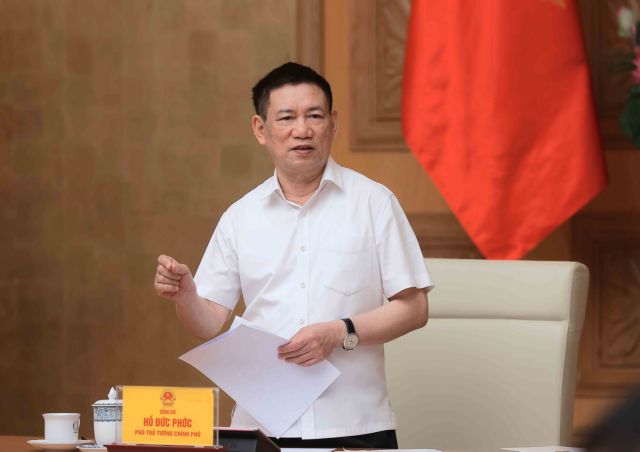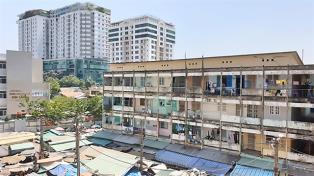Deputy Prime Minister Hồ Đức Phớc urged ministries and localities to implement measures to regulate the real estate sector and manage inflation following a price management meeting in Hà Nội on Tuesday.

HÀ NỘI — Deputy Prime Minister Hồ Đức Phớc has urged ministries and localities to adopt fundamental and coordinated solutions to manage the real estate market and stabilise prices.
He warned that unchecked inflation would undermine the country’s broader economic growth.
Speaking at a meeting of the Price Management Steering Committee on August 5, the Deputy PM, who also heads the committee, called for urgent measures to ensure price stability in the remaining months of 2025.
The session reviewed price regulation performance over the past seven months and set out tasks for the remainder of the year.
Inflation remains under control
Deputy Minister of Finance Lê Tấn Cận reported that since the beginning of the year, market prices have fluctuated in line with seasonal trends. Prices rose early in the year during the Tết period and eased in March.
In the second quarter, the consumer price index (CPI) increased modestly in April and May (by 0.07–0.16 per cent), before rising more sharply in June (0.48 per cent month-on-month) due to higher fuel prices and costs ofconstruction materials, including bricks, sand and stone.
Over the first seven months of the year, CPI was estimated to have increased by up to 3.3 per cent year-on-year — a level deemed appropriate for supporting economic growth amid efforts to maximise development resources, he said.
The deputy minister noted that Việt Nam’s inflation is being held within the 5 per cent ceiling set by the National Assembly and the Government, contributing to macroeconomic stability.
The Ministry of Finance forecast that several factors could continue to place upward pressure on prices in the final months of the year, although some elements may help ease it. The updated CPI scenario projects average increases of up to 4 per cent for the last five months. If monthly CPI growth is evenly distributed, each remaining month would have room for a 1.58 per cent increase without exceeding the annual inflation target.
Committee members agreed that the Steering Committee has fulfilled its assigned tasks. Price regulation efforts over the past seven months met their objectives. Members proposed several practical, effective and sustainable solutions to guide future policy.
Price management to drive sustainable growth
Praising the contributions of the committee members, Phớc urged the Ministry of Finance to incorporate feedback into a refined report and swiftly implement the necessary measures.
He emphasised that effective price regulation was crucial. Without controlling inflation, growth would have limited real-world impact on people’s lives and businesses. Rational and well-targetd pricing measures are thus essential to achieving fast and sustainable growth.
The deputy PM called on ministries and localities to closely monitor the prices of essential goods tied to livelihoods and business operations, particularly fuel, electricity, rice and meat, and prepare appropriate regulatory responses.
He tasked the Ministry of Construction, the Ministry of Agriculture and Rural Development and the Ministry of Natural Resources and Environment with working alongside provincial authorities to devise fundamental, coordinated measures for real estate market oversight.
Phớc also addressed issues like regulation of money supply, stability of the exchange rate between the Vietnamese đồng and the US dollar, pricing of electricity, and costs of construction inputs.
He requested concerted implementation of all necessary measures to keep CPI at a reasonable level and stimulate economic growth. By October, all ministries and agencies must finalise their pricing strategies for 2026 to ensure proactive planning for the upcoming years.
Agencies were instructed to strengthen market price monitoring, particularly for essential goods and services, and to remain flexible in adjusting supply and demand to stabilise the market, avoid shortages or price shocks and maintain social welfare.
He also called for ministries and local governments to closely monitor supply-demand dynamics and price fluctuations in their sectors, and respond promptly to emerging issues, especially during peak periods for fuel, building materials, foodstuffs, agricultural inputs, and transport services. Any signs of supply disruption or abnormal price hikes must be addressed swiftly.
Authorities must rigorously enforce price listing, disclosure and stabilisation rules, and strictly penalise price gouging or manipulation that destabilises the market.
Fiscal policies must be coordinated with monetary and other macroeconomic measures to maintain overall economic balance, control inflation and ensure key economic fundamentals.
Lastly, the deputy PM underscored the importance of transparent communication. He instructed relevant agencies to strengthen public information efforts to clarify price developments, government responses, and the costs of key production materials and essentials. This is vital to curb inflationary expectations and stabilise public and business sentiment, he said. — VNS




